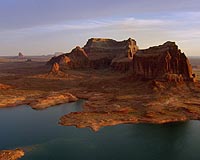Colorado River reservoirs may bottom out by mid-century
Boulder CO (SPX) Jul 21, 2009 – All reservoirs along the Colorado River might dry up by mid-century as the West warms, a new study finds. The probability of such a severe shortage by then runs as high as one-in-two, unless current water-management practices change, the researchers report. The study’s coauthors looked at the effects of a range of reductions in Colorado River stream flow on future reservoir levels and at the implications of different management strategies. Even under the harshest drying caused by climate change, the large storage capacity of reservoirs on the Colorado might help sustain water supply for a few decades. However, new water management approaches are critical to minimize the chances of fully depleting reservoir storage by mid-century. “This study, along with others that predict future flow reductions in the Colorado River Basin, suggests that water managers should begin to re-think current water management practices during the next few years, before the more serious effects of climate change appear,” says lead study author Balaji Rajagopalan of the University of Colorado in Boulder (CU-Boulder). The findings by Rajagopalan and his colleagues have been accepted by the journal Water Resources Research, published by the American Geophysical Union (AGU). The Colorado River system is enduring its 10th year of a drought. Fortunately, the river system entered the drought in 2000, with the reservoirs at approximately 95 percent of capacity. The reservoir system is currently at 59 percent of capacity, about the same as this time last year, says Rajagopalan. Roughly 30 million people depend on the Colorado River for drinking and irrigation water. …
